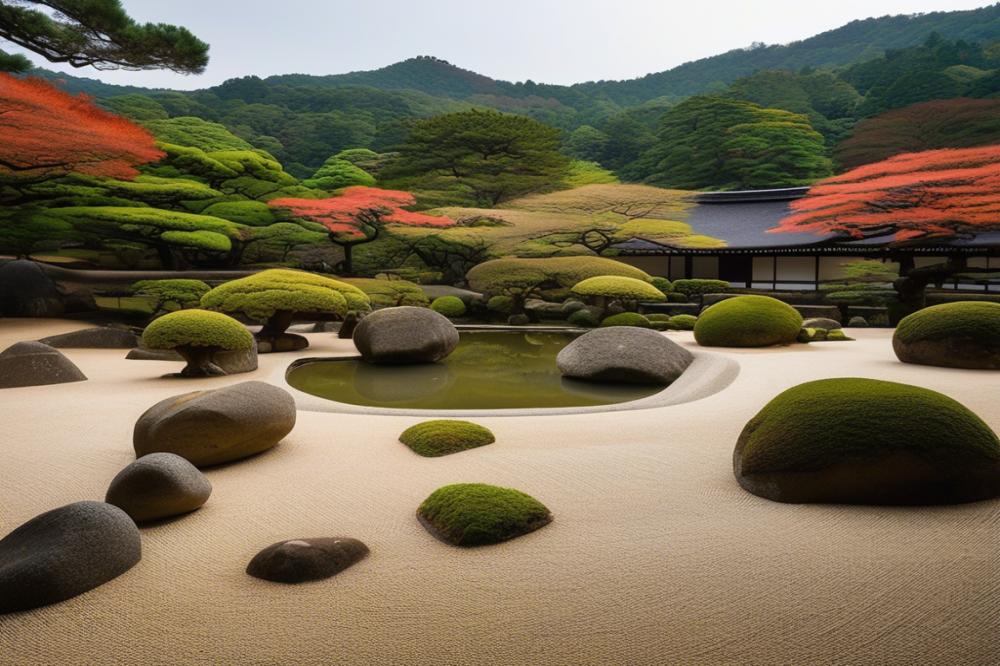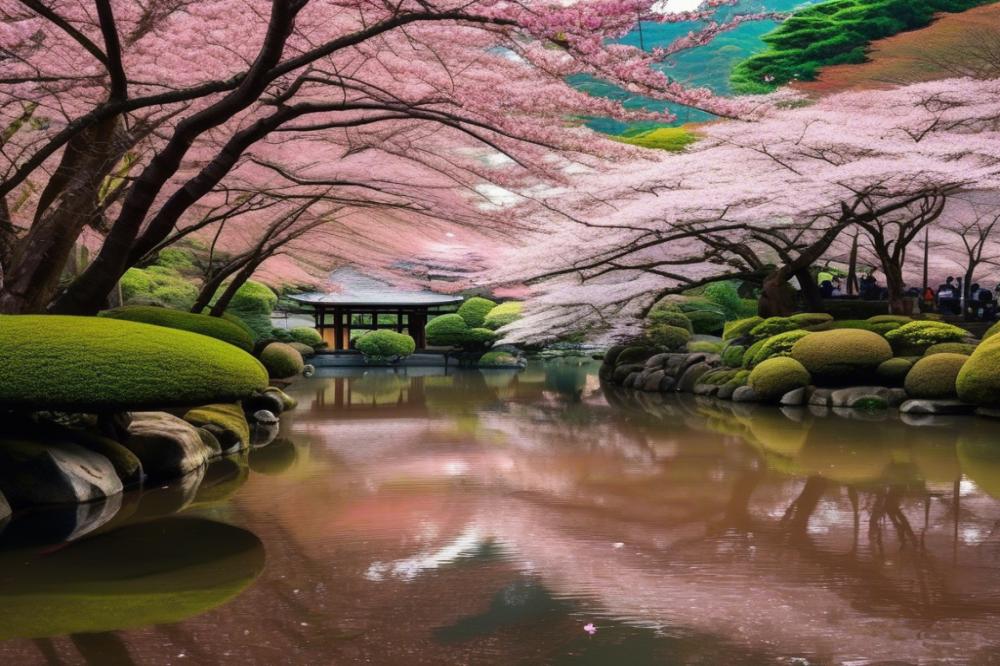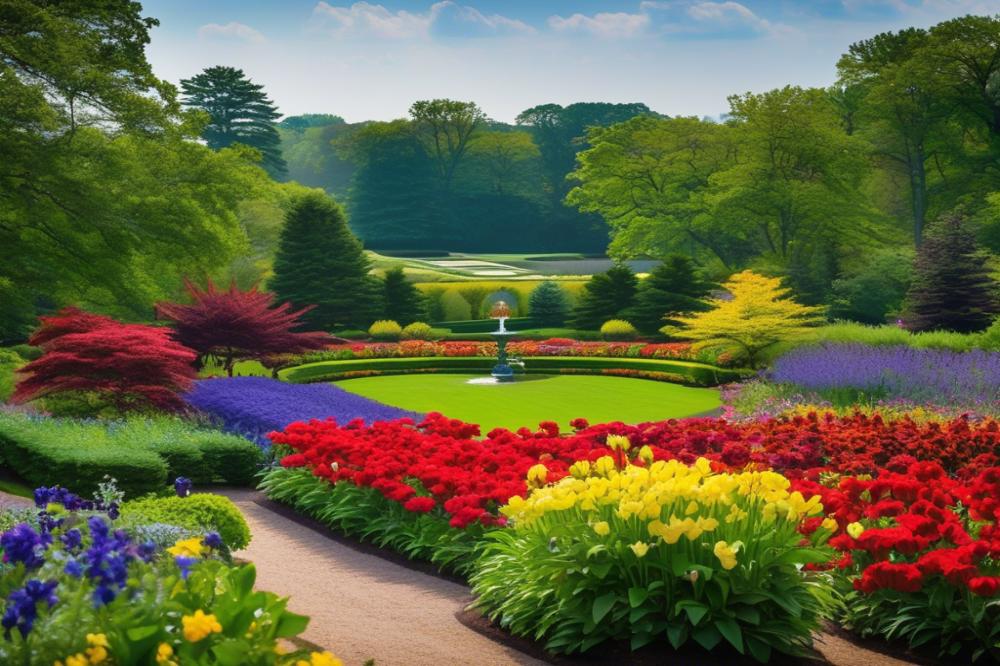The Serene Ryoanji Rock Garden in Kyoto, Japan
The Ryoanji Rock Garden stands as a shining example of Japanese gardens, captivating visitors from around the globe. Nestled in the heart of Kyoto, this serene landscape reflects centuries of tradition and deep cultural heritage. Its meticulous design and profound simplicity showcase the beauty of rock gardens, a significant aspect of Japanese art. As a UNESCO World Heritage site, it attracts not only tourists but also scholars and artists seeking inspiration.
This garden is more than just a physical space; it embodies the themes of tranquility and meditation associated with Zen Buddhism. It invites people to pause, reflect, and engage with their surroundings. Every stone, each patch of gravel, has a purpose that extends beyond decoration. Such landscapes often encourage introspection and offer a chance for spiritual contemplation. Visitors find themselves drawn to the subtle serenity that permeates the air.
Rich in history, Ryoanji Rock Garden represents a profound connection between nature and the human experience. The carefully arranged rocks evoke curiosity and invite various interpretations, sparking thoughts in those who observe them. The beauty lies in their simplicity, which promotes a sense of peace and calm. The scenery reflects a philosophy that values minimalism as a path to enlightenment.
Strolling through this space can be a transformative experience. One might find themselves losing track of time, absorbed in the quiet whispers of nature. Each visit offers a unique opportunity for understanding and self-discovery. This connection with the landscape design of Japanese gardens creates an atmosphere where one can truly embrace the feelings of serenity. The Ryoanji Rock Garden serves as a timeless reminder of the art of living quietly and thoughtfully.
Historical Background
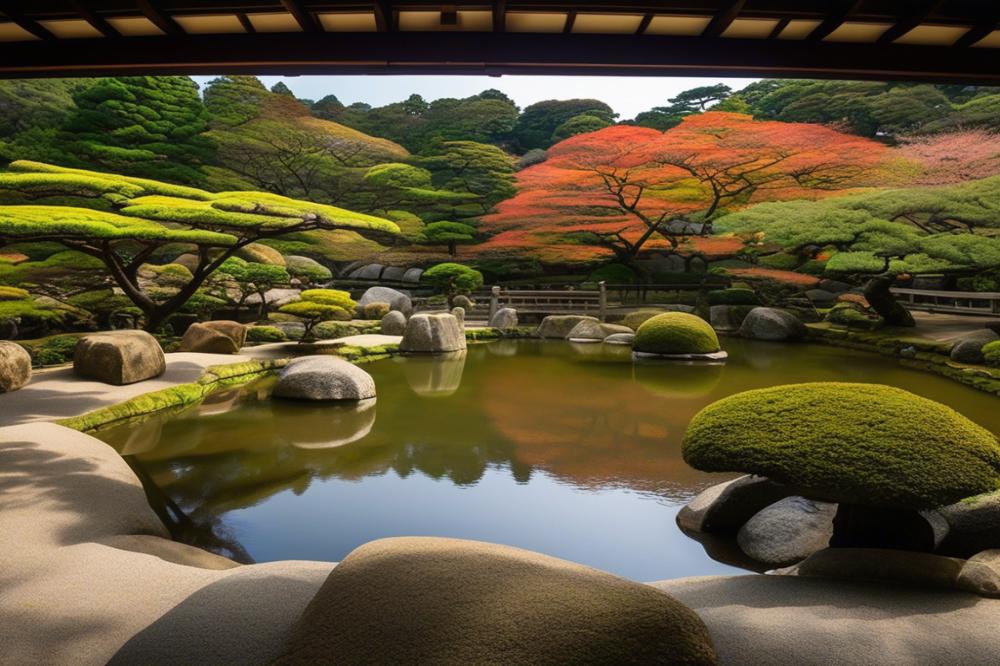

The Ryoanji Rock Garden traces its roots to the late 15th century. This period in Japan was significant for the development of Zen Buddhism. At that time, Kyoto was a center for cultural and spiritual growth. The garden reflects the principles of Zen, particularly in its simplicity and emphasis on meditation.
Zen Buddhism greatly influenced landscape design in Kyoto. Gardens became spaces for reflection and tranquility. People often visited these areas to escape the hustle of daily life. The design of rock gardens, including this one, emphasizes natural beauty. Elements like stones and gravel are arranged purposefully, aiming to inspire peace.
Another interesting aspect lies in the garden’s historical figures. One of the most notable individuals linked to Ryoanji is the famed tea master, Sen no Rikyū. His teachings on simplicity and mindfulness impacted how gardens were perceived. Over the years, these teachings permeated Kyoto’s landscape design, resulting in environments that foster meditation.
Ryoanji has not remained stagnant. It has seen various changes and restorations throughout the centuries. Today, it is recognized as a UNESCO World Heritage site. This designation highlights its cultural heritage and historical significance. Visitors from around the globe admire its unique scenery, captivated by the stillness it offers.
In summary, the history of this rock garden serves as a microcosm of Kyoto’s broader evolution. It stands as a testament to the lasting impact of Zen ideals on Japanese gardens. Each stone and raked line of gravel contributes to a sense of serenity. Amidst all the change, Ryoanji remains a cherished symbol of tranquility.
Landscape Design and Features
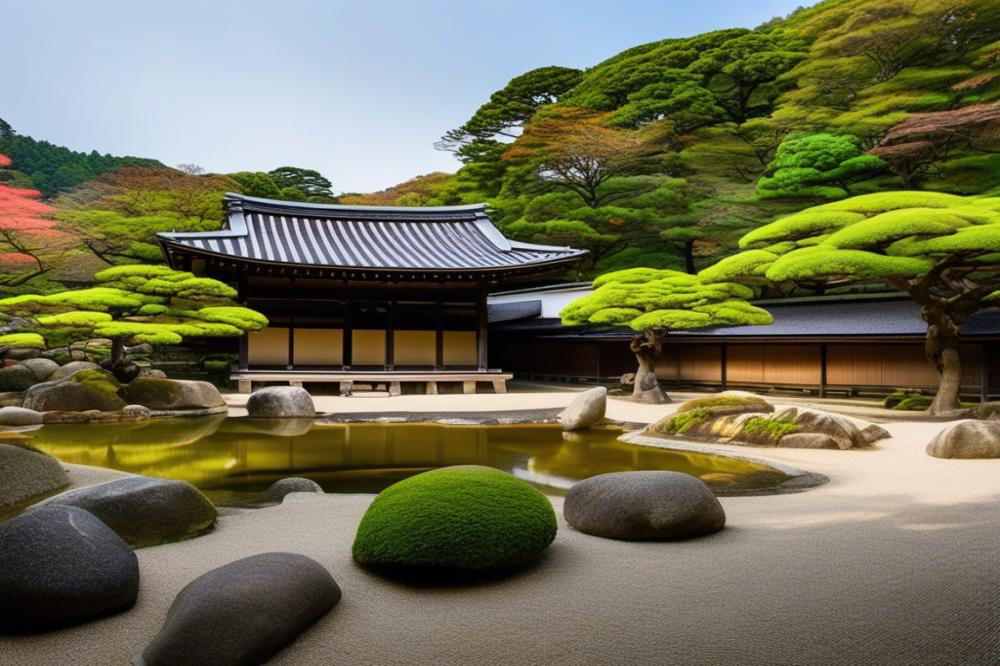

The Ryoanji Rock Garden stands as a powerful testament to the beauty of minimalist design. Situated in Kyoto, this garden captivates visitors with its simplicity. Arranged with precision, the rocks, gravel, and moss create a serene atmosphere, inviting guests to pause and reflect. Each element serves a purpose, forming an intentional layout that sparks contemplation.
Upon entering, the eye is immediately drawn to the carefully placed stones. Seventeen rocks are scattered across a bed of raked gravel, symbolizing the harmony found in nature. The layout encourages a personal interpretation, allowing people to see different meanings based on their own experiences. Such symbolism weaves the garden into the rich fabric of Japanese gardens, where every detail holds significance.
This space promotes tranquility and meditation. The soft sound of gravel underfoot adds to the peaceful ambiance. Visitors find themselves disconnected from the hustle of daily life, lost in thought. The landscape design fosters an environment for mindfulness and introspection. The simplicity of the elements encourages a focus on the present moment.
Historical influences shape the garden’s aesthetic. Dating back to the late 15th century, it showcases traditional Japanese garden design principles. Recognized as a UNESCO World Heritage site, Ryoanji embodies valuable cultural heritage, reflecting centuries of artistic vision. The inclusion of rock gardens in Japanese landscaping draws from nature’s unadorned beauty, further enhancing its appeal.
Surrounding scenery adds depth to the experience. Lush greenery encircles the garden, creating a stark contrast to the gravel and rocks. As seasons change, so does the garden, offering new perspectives throughout the year. Each visit provides a fresh lens to appreciate the static beauty of the rocks against the vibrant life outside.
Ultimately, the Ryoanji Rock Garden invites everyone to explore their thoughts. In this peaceful enclave, one can find a greater understanding of themselves and the world around them. The harmonious balance of its design makes it an enduring symbol of tranquility, representing the essence of Japanese landscape artistry.
Cultural Heritage and Significance
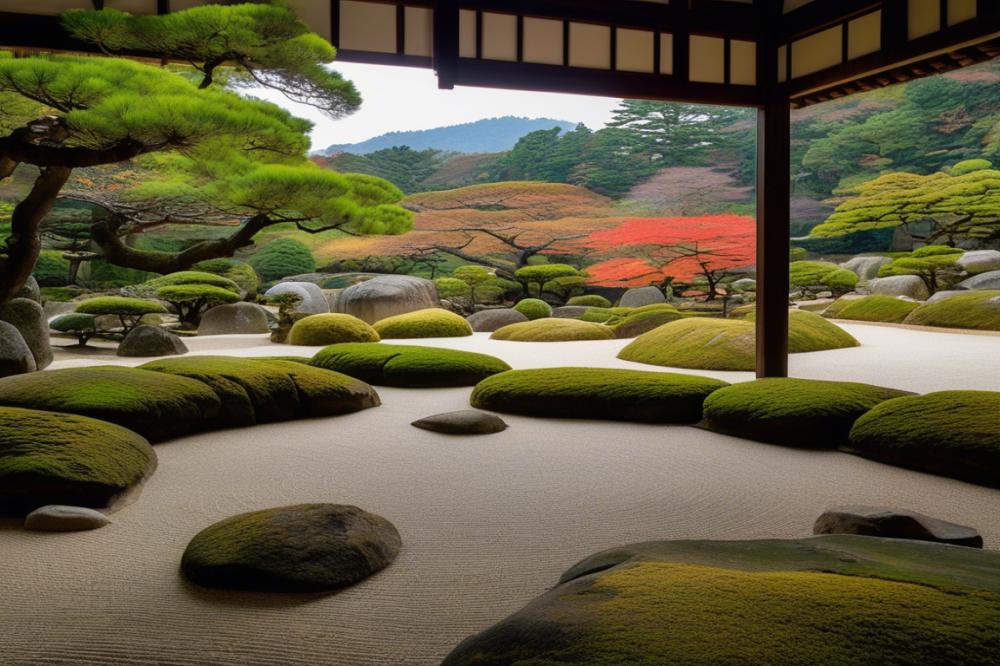

The Ryoanji Rock Garden holds a vital place in the world of Japanese gardens. Its design embodies the essence of Zen principles, focusing on simplicity and mindfulness. Visitors often find themselves captivated by the unique scenery of meticulously placed rocks and raked gravel. This landscape design encourages a deep connection to nature and the inner self.
History plays an important role in the garden’s cultural heritage. Dating back to the 15th century, it reflects the aesthetic beliefs of the Muromachi period. The garden is often considered a masterpiece of dry landscape gardening, commonly known as a rock garden. Each element is deliberately arranged to evoke feelings of tranquility and contemplation.
As a UNESCO World Heritage site, the Ryoanji’s significance extends beyond its physical presence. It serves as a symbol of cultural pride for Japan and attracts scholars and tourists alike. This serene location becomes a refuge for those seeking meditation amidst the chaos of modern life. Even today, it remains a spot for quiet reflection, allowing visitors to disconnect from their busy routines.
Modern aesthetics continue to draw inspiration from this garden. Its influence can be seen across various art forms, including painting and architecture. By appreciating the harmonious balance of nature and design, people engage with the fundamental values of Japanese culture. Such appreciation underscores the timeless nature of its impact on society, transcending generations.
Visiting Ryoanji Rock Garden
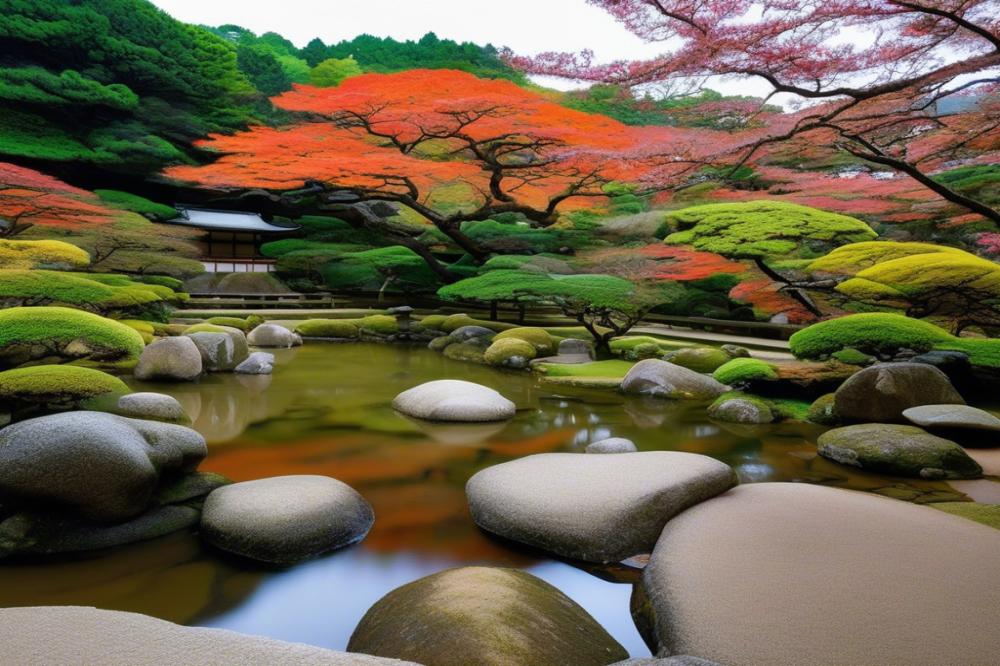

For anyone interested in Japanese gardens, the Ryoanji Rock Garden is a must-see. Located in Kyoto, this iconic spot is accessible by public transport. Visitors can take the JR train to Kyoto Station and then transfer to a bus or taxi. The journey provides a great opportunity to soak in the beautiful surroundings of the city.
Timing your visit matters greatly. Early morning or late afternoon are ideal. During these hours, the light falls just right, enhancing the natural beauty of the garden. You will also find fewer crowds, allowing for a more personal experience. Peaceful moments await those who choose a quiet time to reflect.
The landscape design of the garden is remarkable. It features carefully arranged stones, moss, and raked gravel. This simple, yet profound design invites contemplation. Visitors can observe how each stone adds to the overall ambience. The scenery around Ryoanji blends traditional architecture with lush greenery, creating a stunning backdrop.
When you arrive, take a moment to breathe deeply. The tranquility of this space encourages meditation and reflection. Sitting quietly allows visitors to absorb the garden’s beauty. It’s easy to get lost in your thoughts here. Consider bringing a notebook to jot down reflections or sketches inspired by the surroundings.
Observe the history that envelops this spot. Ryoanji is a UNESCO World Heritage site, recognized for its cultural heritage. Each visit is a journey into Japan’s past, as well as its ongoing traditions. Engaging with the garden fully requires intentionality. Focus on the details—the patterns in the gravel, the textures of the moss, and the serene arrangement of stones.
Lastly, respect the garden’s rules. Maintain a quiet demeanor and avoid walking on the stones. By doing so, you help preserve this unique gem for future generations. Consider visiting nearby temples to deepen your experience of Kyoto’s Japanese gardens. The serene atmosphere will linger long after you leave.
Reflections on the Ryoanji Rock Garden
The Ryoanji Rock Garden stands as a timeless symbol of Japanese cultural heritage and landscape design. Its simplicity evokes a sense of peace that connects visitors to centuries of tradition. Known for its carefully arranged stones and raked gravel, this site invites deep contemplation. Many seek it out as a place for meditation, where the noise of the outside world fades away.
Visiting this serene locale in Kyoto allows individuals to appreciate the artistry inherent in Japanese gardens. Each element within the garden is thoughtfully placed, encouraging a harmony between nature and mindful reflection. The beauty of the landscape serves as a reminder of the fragile balance between humanity and the natural world.
A trip to the Ryoanji Rock Garden offers more than just visual pleasure; it provides an opportunity for personal discovery. People leave with a renewed sense of tranquility, inspired by the garden’s Zen qualities. This peaceful experience showcases the garden’s significance, not only to Japan but also to anyone seeking solace.
Dare to step into this tranquil space. Let the serene atmosphere wash over you, and take a moment to breathe and reflect. Engaging with the Ryoanji Rock Garden is an invitation to slow down and appreciate the finer details of life. Ultimately, it promises a journey worth taking for anyone looking to reconnect with themselves and the world around them.

